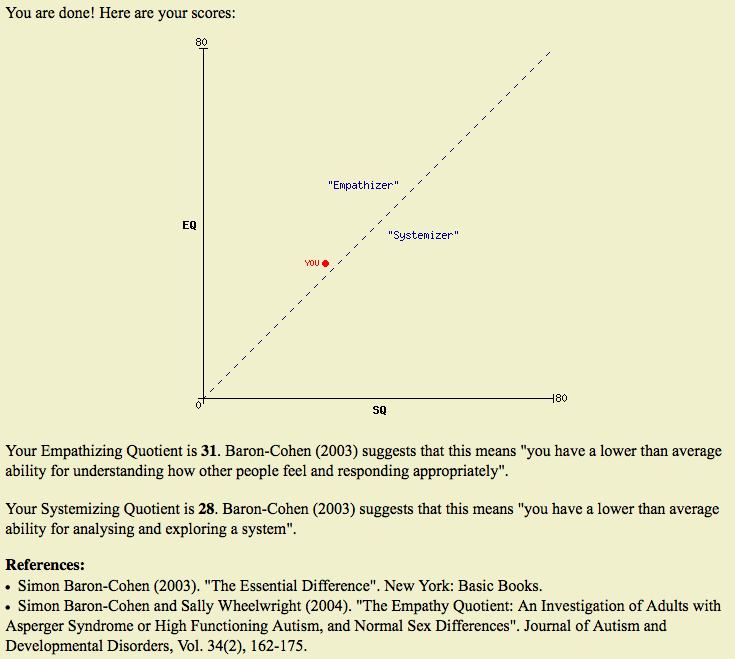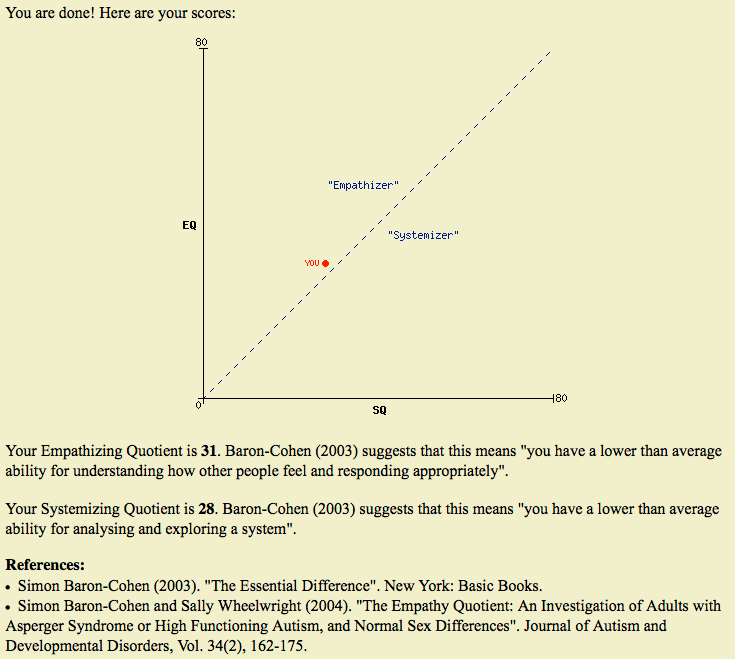I heard about a study where they linked the type of music you like with your personality traits, or vice versa; I’m not sure which comes first in this chicken/egg scenario.
Any time I hear about music studies, my interest is automatically piqued. And then, I forgot about it for a while, until I added some music in very disparate genres into my iTunes library. So, today, we’re going to study the study and see how it holds true.
The study was published at PLOS ONE, a science journal I’ve never heard of, however, the article seems to be peer reviewed, which gives me slightly greater confidence in the results. In any event, I take the source material with a grain of salt.
Unless otherwise linked, all quotes in this post are from the article at PLOS ONE.
The Premise
Why do we like the music we do? Research has shown that musical preferences and personality are linked, yet little is known about other influences on preferences such as cognitive styles. To address this gap, we investigated how individual differences in musical preferences are explained by the empathizing-systemizing (E-S) theory.
OK, so they’re trying to link cognitive styles to type of music preferred. What’s this empathizing-systemizing (E-S) theory then?
The empathizing–systemizing (E–S) theory suggests that people may be classified on the basis of their scores along two dimensions: empathizing (E) and systemizing (S). It measures a person’s strength of interest in empathy (the ability to identify and understand the thoughts and feelings of others and to respond to these with appropriate emotions); and a person’s strength of interest in systems (in terms of the drive to analyse or construct them).
I’m highly skeptical of horoscopes since they shove people into only twelve pigeon-holes; this empathizing-systemizing (E-S) theory uses only two. Also, is it a theory, i.e., provably true with data to support it, or is it only an hypothesis? The Wikipedia page refers to it as both.
Theories and hypotheses are not the same. You can’t just call a scientific premise a theory willy-nilly. Until you have definitive proof, it’s an hypothesis. I’ll get off my soap box now, but that drives me batty.
Essentially, the “E-S Theory” is supposed to graph all people on a chart between systemizing and empathizing. Most people are supposed to fall closer to one or the other, which makes sense I suppose when dealing with only two sort of contrary criteria.
Also, in the interest of disclosure, I noticed that both the empathizing-systemizing (E-S) theory/hypothesis, and the study from the Journal PLOS ONE were written, at least in part, by this man, Simon Baron-Cohen:

Not that his picture has anything to do with anything, but I like to know who’s doing the talking. Also, his name is remarkable similar to this man, Sacha Baron-Cohen, a comedian and professional bullshitter:

Anyway, moving on since that’s probably not relevant at all.
Essentially, the premise of the study is to categorize all musical preferences and personality types into two groups: empathizing and systemizing, which automatically makes me leery.
Today’s Horoscope: Be cautious of studies from unknown science journals written by people with the same last name as comedians.
The Mechanics
Since this study separately measures (I hope it’s separate–otherwise we’re dealing with a correlation/causation problem from the get-go) what type of music a person prefers and what type of personality that same person has, before I looked at the study’s results, I was most curious as the mechanics of the study. According to Baron Cohen, that would make me a systemizer.
There are millions of possible variations in both personality and musical preference, so I wanted to see how they took that into account.
Facebook users were able to complete a variety of psychology-related questionnaires.
So, Facebook. They used personality test results from people who take those online personality tests and share them on Facebook. Automatically, that means you’re limiting personalities and dealing only with certain personality types, since only some people are likely to do Facebook surveys, e.g., not me.
Each sample completed the same empathy measure but they differed in the musical stimuli presented to them.
Well, at least we settled the correlation/causation question.
By reporting their preferential reactions to musical stimuli, samples 1 and 2 (Ns = 2,178 and 891) indicated their preferences for music from 26 different genres, and samples 3 and 4 (Ns = 747 and 320) indicated their preferences for music from only a single genre (rock or jazz).
So, the first two groups of 3,000+ people were asked to give their opinions on 26 styles of music, while the second two groups, made up of 1,000+ people were asked to give only their opinion of rock and jazz respectively.
If I was in group 4, I’d be screwed since jazz is one of my least favorite genres ever. Anyway…
Results across samples showed that empathy levels are linked to preferences even within genres and account for significant proportions of variance in preferences over and above personality traits for various music-preference dimensions.
Alright, so they found that even in groups 3 and 4 that only listened to rock and jazz respectively, personality differences (between only empathizing and sympathizing) were apparent.
Conclusions
Those who are type E (bias towards empathizing) preferred music on the Mellow dimension (R&B/soul, adult contemporary, soft rock genres) compared to type S (bias towards systemizing) who preferred music on the Intense dimension (punk, heavy metal, and hard rock).
And that right there is why the study first interested me, because I like music in ALL OF THOSE GENRES.
Analyses of fine-grained psychological and sonic attributes in the music revealed that type E individuals preferred music that featured low arousal (gentle, warm, and sensual attributes), negative valence (depressing and sad), and emotional depth (poetic, relaxing, and thoughtful), while type S preferred music that featured high arousal (strong, tense, and thrilling), and aspects of positive valence (animated) and cerebral depth (complexity).
Again, depending on my mood, I like all of those descriptors. I like hip hop, hardcore punk and heavy metal. I like classical, classic rock and country. I like big band, blues and bluegrass. Ska, soul and stoner rock. Progressive, psychedelic and post rock. Folk, funk, flamenco.
My iTunes library has over 40K songs in practically every genre from all of recorded human history. It has over 26 genres of music in the letter A alone. My full shuffle just went from Frank Sinatra to Astronautilus to Cause For Alarm to Parliament. This could go on forever, but you get the picture.
Classify that, Simon Baron-Cohen.
Based on my musical taste, you can’t presuppose that I’m either empathetic or systematic. So, which am I? Well, just to be thorough, I took the personality test.
Just as my musical taste is all over the map, so is my emphathizing and systemizing. At least that much is consistent.

According to the test, I’m almost right in the middle. I have a “lower than average ability for understanding how other people feel and responding appropriately” and “a lower than average ability for analyzing and exploring a system.”
Because I’m almost dead in the middle, I’m terrible at both systemizing and empathizing. I’m an anomaly and below average at everything. I have failed at human; maybe I’d be a better sea otter.

Commentary
I think it’s fair to say that, just as every human who has ever or will ever exist on this planet cannot be easily classified as one of twelve astronomical signs, it’s even less accurate when you attempt to shove those same people in only two categories. Then, when you extrapolate those results into musical taste, well, things start getting silly.
And, really, what’s the point anyway? We like what we like, no matter whether we’re an E or an S.
Also, I think generalizations of any kind are bunk. So, thanks for that.
Following the incredibly broad brush strokes laid out here, are you a systemizer or an empathasizer based on the music you like? If you want to go for extra credit by taking the personality test, how accurate are your results, especially when compared to the type of music you prefer?







